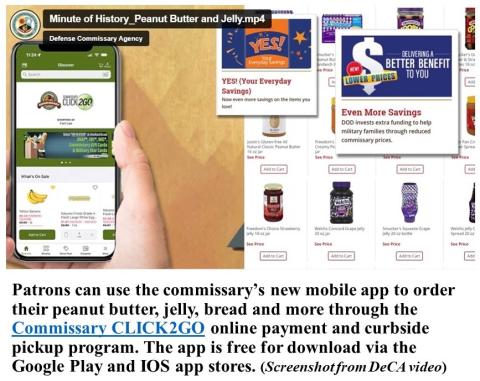PEANUT BUTTER, JELLY & BREAD: For US troops, the PB&J sandwich perhaps dates back to WW I ‘Doughboys’ who just wanted to stretch their rations

NOTE: To see a DeCA video related to this release, click here.
FORT LEE, Va. – Mention PB&J to an American soldier, and many can recall making that “perfect” peanut butter and jelly sandwich to hit the spot when their stomach needed a quick, tasty snack.
No one knows who invented the PB&J, but for U.S. service members that sandwich goes back to at least World War I when enterprising troops combined elements of their rations to create a culinary masterpiece.
“Troops in the field have always been quite imaginative when it comes to making a tasty treat out of an otherwise bland ration,” said Marine Sgt. Maj. Michael R. Saucedo, senior enlisted advisor to the Defense Commissary Agency director. “Back in garrison, service members and their families need only visit their commissary to find the peanut butter, jelly and bread they require for their pièce de résistance – at savings of at least 25 percent compared to commercial stores.”
So, what’s the story behind peanut butter, jelly and bread in the U.S. military? Well, let’s take the ingredients one at a time, starting with bread.
Regardless of what kind of sandwich you like, the foremost ingredient is a good bread. Throughout history, bread was one of the most common items given to U.S. troops in their daily ration. Troops could expect a pound of flour or a loaf of baked bread. In fact, bread was such a common item in rations that military branches would eventually open their own baking schools and bakeries.
During the American Revolution when baked bread wasn’t available, troops made fire or ash cakes by mixing together flour from their rations, water and a pinch of salt. They would then lay the dough over the warm ashes to bake. Sailors at sea were served ships’ biscuits, also known as hardtack. The weevils and maggots that often infested them were just an added source of “protein.”
During the American Civil War, hardtack was still standard fare for soldiers, however the Union Army had bakeries where thousands of loaves of fresh bread were baked each day, often shipped by train and arriving while it was still fresh and warm.
When America entered World War I, bakeries were providing fresh, hot bread to the troops in the trenches each day, and by World War II, bread was being included in C-rations and served in mess halls.
During the Korean War, U.S. soldiers were receiving ration cans with various types of bread and crackers. The B-ration was known as the bread ration, and it held a slice of bread, some crackers and usually a cookie or slice of cake.
Now let’s talk about peanut butter. Americans each eat more than 6 pounds of peanut butter every year. One peanut butter sandwich contains at least 6 grams of protein and over 3 grams of dietary fiber. It’s also rich in vitamin E and magnesium. Add jelly to the sandwich and you have about 15 grams of carbohydrates, giving you plenty of energy.
Soldiers in both world wars, the Korean War and Vietnam War were issued a one-and-a-half ounce can of creamy peanut butter in their rations. Most of the cans were issued in B-ration kits along with crackers and the dessert entrée.
The trio of peanut butter, jelly and bread seems to have collided for soldiers during World War I. Many of them began taking the bread ration, peanut butter spread and concord grape jelly and adding them together to stretch their rations. Throughout World War II, soldiers continued to create PB&J sandwiches from the ingredients in their B-ration kits. Meat shortages during the wars made the sandwiches an important protein source.
Saucedo encouraged patrons to use DeCA’s new mobile app to go online to order their peanut butter, jelly, bread and more through DeCA’s Commissary CLICK2GO online payment and curbside pickup program. The app is free for download via the Google Play and IOS app stores for Android and Apple devices, respectively.
“If your family loves peanut butter and jelly sandwiches like mine does, then head to your local commissary, where you’ll find a wide selection of peanut butter and jelly, as well as several varieties of fresh bread,” Saucedo said. “We even have our own Commissary Store Brands, such as Freedom’s Choice, to save you even more money.”
-DeCA-
About DeCA: The Defense Commissary Agency operates a worldwide chain of commissaries providing groceries to military personnel, retirees and their families in a safe and secure shopping environment. Commissaries provide a military benefit, saving authorized patrons thousands of dollars annually on their purchases compared to similar products at commercial retailers. The discounted prices include a 5-percent surcharge, which covers the costs of building new commissaries and modernizing existing ones. A core military family support element, and a valued part of military pay and benefits, commissaries contribute to family readiness, enhance the quality of life for America’s military and their families, and help recruit and retain the best and brightest men and women to serve their country.
